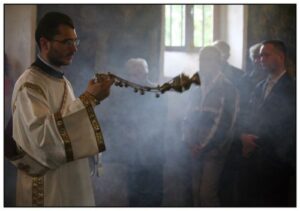Protestant visitors to the Orthodox Liturgy are often surprised by the abundance of images in the sanctuary. Where Orthodox churches have icons all over, Reformed churches shun icons having only bare walls. Another surprise for the Protestant visitor is the smell of incense when the priest comes out swinging his censer. Aside from the smell of the ink on the bulletin or from the bible in their hands Protestant churches are odor free.
 Robin Phillips recently wrote an insightful blog posting “Recovering the Spirituality of Scent.” In it he describes how Calvin’s denigration of the sense of smell in worship stems from a tendency to Gnosticism.
Robin Phillips recently wrote an insightful blog posting “Recovering the Spirituality of Scent.” In it he describes how Calvin’s denigration of the sense of smell in worship stems from a tendency to Gnosticism.
He points out that Calvin in his commentary on the Gospel of John chapter 4 saw the use of incense as inappropriate for worship in the Christian age. I wasn’t aware of this until I read Phillips’ article, but was even more shocked when I read Calvin first hand. I was surprised to find out how sweeping Calvin’s exclusion was. No candles, no vestments, no altars, no liturgical rituals as well as no incense!
Formerly incense, candles, holy garments, an altar, vessels, and ceremonies of this nature, pleased God; and the reason was, that nothing is more precious or acceptable to Him than obedience. Now, since the coming of Christ, matters are entirely changed. We ought, therefore, to consider what he enjoins on us under the Gospel, that we may not follow at random what the Fathers observed under the Law; for what was at that time a holy observation of the worship of God would now be a shocking sacrilege. (Emphasis added.) Source
The curious fact here is that nowhere in the New Testament do we find a teaching, explicit or implied, that the old form of worship has been abolished and replaced by a new order of worship. One would have to read certain assumptions into the New Testament to reach these conclusions. Underlying Calvin’s puritanical approach to worship is an early form of JN Darby’s dispensationalism. Calvin sees a major break between the Old and New covenants including their forms of worship.
Calvin’s Break from Historic Christian Worship
Robin Phillips points out Calvin overlooked the fact that the use of incense and liturgical worship has been part of historic Christian worship. In other words Calvin is advocating a major break from historic Christian worship. Phillips notes:
It is true that the Christian church has never ceased to use smell in its liturgical piety. In the Eastern Orthodox, Roman Catholic and Anglican traditions, incense made from Frankincense and other odor-producing plants forms an important part of their worship. Nevertheless, it is still safe to say that the spiritual importance of scent has been largely eclipsed in the Western world, especially among evangelical Protestant. (Emphasis added.)
This suggests that the Reformed, especially Puritan, approach to worship marks a break from the historic pattern of worship. It is like a branch broken off from the main trunk.
Mind-Body Disconnect
 Robin Phillips has done some excellent work recently on the Gnosticism within the Protestant world and this disembodied approach to worship would explain the cerebral nature of Reformed Protestantism. If that is the case then we can see the emotionalism in Baptist revivalism and Pentecostal exuberance as reactions against Reformed cerebralism. See: “Are Calvinists Also Among the Gnostics?” by Robin Phillips
Robin Phillips has done some excellent work recently on the Gnosticism within the Protestant world and this disembodied approach to worship would explain the cerebral nature of Reformed Protestantism. If that is the case then we can see the emotionalism in Baptist revivalism and Pentecostal exuberance as reactions against Reformed cerebralism. See: “Are Calvinists Also Among the Gnostics?” by Robin Phillips
When I was a Protestant, I read the story of Jesus’ anointing at Bethany with a mixture of wistful longing and curiosity (John 12:1-3). This beautiful gospel scene was so unlike anything I had experienced as a Protestant. I felt this disconnect when I was a Protestant, but now that I am Orthodox I have some idea of what it must have been like to be in Jesus’ presence with the fragrance all around me. Orthodox liturgy helps me to connect with the Bible. It gives me an inkling of an idea of the smoke filled temple Isaiah described in Isaiah 6 and helps me to anticipate the heavenly worship that the Apostle John wrote about in Revelation 5:9 and 15:8.
The smell of incense is more than aroma therapy; it is profoundly theological. The sense of smell is an affirmation that I have a body. Christ in his Incarnation came to save our entire being – body, soul, mind, and spirit, not just our intellects. The Orthodox approach to worship provides an embodied approach to worship; the Reformed approach on the other hand is quite cerebral and disembodied. Robin Phillips’ recent blog posting raises some important questions about Reformed theology and worship. The absence of incense is not curious aberration but the tip of a theological iceberg, i.e., the tendency to Gnosticism in Reformed theology. While quite provocative, his questions deserve consideration.
Robert Arakaki
See also
Response to Robin Phillps: Are Calvinists Also Among the Gnostics



I have a beautiful calfskin Cambridge KJV. It smells wonderful. I don’t really use it and keep it in the box it came in but every once in awhile I’ll take it out, mostly just to take a whiff.
me too hinderlander…but my leather sniff is an old
baseball glove. not something we find in worship! lol
calvin’s implicit gnosticism and even borderline
dispensationalism is surprising though. i’d have ex-
pected more from him. does make him look more
like a dogmatic ideologue…than a biblical theologian,
much less a historic theologian.
My first reaction to Calvinists in practice was “How remarkably Gnostic”.
Bryan,
Welcome to the OrthodoxBridge!
Robert
Thank you, Robert, for this post and the links to some other articles you provided in it. All of them prove that disguised gnostic and montanist concepts or manifestations are those who plague the very basis of the Protestant belief and worship. Unmasking them is very important.
“The smell of incense is more than aroma therapy; it is profoundly theological. The sense of smell is an affirmation that I have a body.”
That’s going in my quote file.
“‘For from the rising of the sun even to its setting, My name will be great among the Gentiles [בַּגֹּויִ֔ם “Gentiles”/”nations”; non-Jews/non-Israelites], and in every place incense is going to be offered to My name, and a grain offering that is pure; for My name will be great among the Gentiles’ says the LORD of hosts” (Mal 1:11).
Dave,
Thanks for the beautiful bible quote!
Robert
What happened to the grain offering?
Mr Hale’s comment about the grain offering is interesting, and I’ve had another idea I’ve toyed with: if Ezekiel 40-48 describes a physical temple, and there is no reason why a figurative reading is to be preferred, then this verse could dovetail nicely. I am not necessarily holding to that position, but it is consistent.
I can say that the further along in my journey to Christ, I have come to understand how God isn’t in the mind but rather He’s everywhere. If i commune with Him, would I not saturate the entire space with things that are for God?
When I pray, my mind and attention are to God. The smell in the room are of incense which is given to God and therefor my sense of smell is now directed to God. The holy icons depicting the holy men and women of God. Thus my vision is directed to God.
How could all the senses not be aimed towards our Father!
Thank you for this post Robert. You really got me to think about what it all means 🙂
Robert, really enjoy the blog and find the articles stimulating, as one ‘on the road’ it answers my burning questions! On this issue I recentlyt read a quote by JC Philpott where he stated ”A religion of sight, sense, and touch is the religion of man.” Think this fits well with what Calvin is driving at here. Problem being it is explicitly gnostic.
Stephen,
Thanks! I’m glad you found it helpful.
Robert
Not to mention, implicitly misanthropic and Docetistic as well. Did God (the Son) not become a man? Why does “of man” necessarily mean “bad” or “inferior”? If you’re a Muslim who sees man as little more than a dog, I can see why you’d say that, but doesn’t the Bible explicitly DEFINE humanity as being nothing less than the very image of God?
Speaking of which, how come Islamic-style calligraphy never caught on among the Calvinists? You’d think, with both faiths being iconoclastic and all, that Reformed churches would have ended up resembling mosques. Many early Calvinists held Muslims (particularly Turkish ones) in high esteem and regarded them as being closer to the truth than the Roman Catholics were. This feeling was reciprocated by the Turks as well, as evidenced by the correspondences between Elizabeth I and Murad III, for instance. I’m surprised Islam didn’t exert a greater degree of influence on the development of Calvinism. Why don’t Reformed churches have Bible verses written in Hebrew or Greek calligraphy on the walls, the way mosques do with Arabic Quran verses? You’d think that would have happened, given that Muslims and Calvinists share belief in the theological supremacy of the WRITTEN word over other forms of tradition and expression.
***Why don’t Reformed churches have Bible verses written in Hebrew or Greek calligraphy on the walls, the way mosques do with Arabic Quran verses?***
Close, but there is some equivocation on the style of calligraphy, with the Arabic being more of a cultural thing. Reformed attitudes toward Islam varied: they could see in Islam a similar movement as the Pagans did to idolatrous Israel. That never moved towards embracing Islam. Indeed, Cromwell’s navy brutalized Islamic pirates.
As to expressions of Reformed worship: surely you realize there are different cultural variants. British and Scottish churches are more stark because they were reacting against a violent Anglo-Catholicism who would burn people who didn’t do the mass. A reaction is certainly understandable if not fully justifiable.
Dutch and German Reformed, lacking that context and in perhaps closer connection to Lutheranism, did not have quite the stark worldview.
They do, though, @Anastasios… Within every reformed church I’ve ever entered, there are inevitably framed, written Bible verses hung on the walls, whether they be in the foyer or the basement (rarely if ever in the room with the four white walls.) Their iconography is the written word.
Silouan,
Thank you for sharing this!
Robert